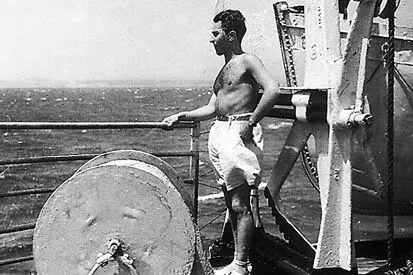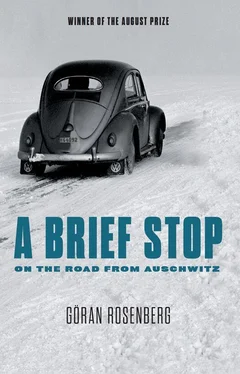And that’s about the size it remains, the refugee colony of Jewish survivors in Södertälje; most people move on. From America come shiny photographs of flourishing babies in bulbous baby carriages, from Israel thin blue aerograms with tightly written sentences on every folded flap of the single sheet. When I tear off the stamps, they leave holes in the sentences.
On second thought, Södertälje isn’t the most obvious place to start life anew. At least not for those who want that life to have anything Jewish about it. The prerequisites for Jewish life don’t exist in Södertälje. Jewish life demands a basic, minimum number of Jews, and in Södertälje that number is never to be reached. During the brief period when it might have been reached, the Jews in Södertälje have other things to think about than Jewish life, assuming they want to think about Jewish life at all. I sense that being Jewish is not something to make a big show of. Not in a place like this. When I tell the two of you that Mr. Winqvist always calls out “ Herein! ” in German when anybody knocks at the classroom door, you worry that I’ll think I know a bit of German and try it out on Mr. Winqvist, when what I possibly might know is a few words of Yiddish. I never let Mr. Winqvist find out that I know a few words of Yiddish. The Jewish elements of our life are toned down. On Friday evenings, Mom blesses the Sabbath candles with a gentle movement of her hand, and on the big Jewish holidays we go to Stockholm. At school I’m excused from Scripture lessons, but when I resist having to be the only exception in the school, there’s little opposition. On summer vacations I’m sent to a camp for Jewish children in the archipelago north of Stockholm that no doubt fulfills its educational purposes, but it’s far from clear what role Jewish life plays in the Project.
I don’t think it’s missing Jewish life that for so long makes you consider moving on. I think it’s the horizons of the Place that refuse to open up to you, in spite of the miracle apartment, and the truck factory, and the mapped-out future, and the daycare center, and Havsbadet, and the Child who’s supposed to make his world yours.
And in spite of Karin and Ingvar.
Ingvar’s the team leader in the pipe gang at the truck factory and a few years older than you; I’m not sure by what words and gestures you soon become friends, but very early on, hanging in the one-room apartment below the railroad station, there’s an oil painting by Ingvar — a vase of flowers. Karin and Ingvar are there before the Child. It’s Karin and Ingvar who suggest giving the Child a name that doesn’t stand out. Karin and Ingvar are there at the Child’s circumcision. “All those people who would soon spread around the world,” Karin writes, much later. “Nobody could speak Swedish. All the men wore hats.”
In what language do Karin and Ingvar become your friends? Not only your sole friends outside the refugee colony, but your best friends at that. You celebrate your first New Year’s Eve in Södertälje in their home. They’re the first to see your first curtains in your first apartment on Villagatan. You raise your first glasses in a toast to Karin and Ingvar’s firstborn child. You also serve coffee in your first glasses, since Ingvar doesn’t drink tea. Ten months later, when your firstborn is due to arrive, Ingvar comes along to the hospital, so that there will be no confusion of languages. After all, Ingvar has some experience by now, and he’s from the Place.
Confusion of languages is my term for the invisible wall rising up between you and the Place, not a wall between languages so much as a wall between worlds, between the world you carry with you and the world you hope to make your own; a wall that no language whatsoever can penetrate. After all, the words are there already — ghetto, death camp, gas chamber, annihilation, extermination — but nobody understands what they mean.
Insofar as they care what they mean.
It must be lonely to live in a place where nobody understands what the words mean, even though you take such pains with them.
Karin writes that you search among the books on their shelves and ask for Strindberg. She writes that you learn Swedish by reading Strindberg and that before long you can write “without spelling mistakes and completely grammatically.”
It’s certainly in the language of Strindberg that you study for your correspondence courses late into the night, in the hope that the horizon will open and the confusion of languages cease.
It’s also certain that as soon as the Child can add one letter to another on the living room floor, you come home carrying a briefcase heavy with library books. The Child’s early reading includes classics like Children of the Forest, Hat Cottage, Cat Goes on a Journey , and Spotty , about a rabbit who’s different from all the other rabbits; but also — and far too early— Conqueror of the Seas: The Story of Magellan , by Stefan Zweig.
Karin and Ingvar understand you better than most people, not because they understand more of your words but because they like you and want to understand you and want you to stay on so that your children can grow up together and you can all cycle out together to the little wooden summerhouse Ingvar has built out of spare packing cases from the truck factory.
The fact that you two hesitate for so long over whether to move on or not, I believe, has something to do with Karin and Ingvar.
On July 9, 1953, carrying two heavy suitcases, you board the train to Marseille via Copenhagen and Paris. You spend a few days in Paris, lugging the cases around. Your French is not on a par with your Swedish, so when you happen to knock into someone on the sidewalk you say S’il vous plaît instead of Excusezmoi , which doesn’t go down very well. You immediately learn to say “sorry” and not “please.” Another sort of confusion of languages, for sure, and easier to sort out.
In Paris you also carry lists with names and addresses of people who might have known people who might have survived the world you come from.
That’s what’s left of the world you come from: lists of names and addresses.
In Paris, one of the names at one of the addresses takes you along to Jo Goldenberg’s newly opened Jewish restaurant on rue des Rosiers, where they serve food that smells and tastes of the world you come from.
That too is left of the world you come from: smells and tastes.
In Marseille, if not before, it comes home to you that the Place is a paradise after all. In Marseille there’s destruction and poverty as far as the eye can see. Walking that last bit through the district around the docks, you keep a tight hold on your suitcases, which are loaded with necessities from Paradise for the Promised Land: clothes, fabrics, canned goods, batteries, lightbulbs. On the ship, a photograph of you in profile. You’re standing by the rail on the top deck, gazing toward the horizon. You’re wearing white shorts and white sandals and are stripped to the waist, your ribs just about visible beneath the tanned skin, no scars visible anywhere. The wind’s blowing your hair back from your high forehead. I’d like to read yearnings for another world into your gaze, but I don’t know whether the picture was taken on the way to Israel or on the way back, so it could just be that what I see is homesickness for the one-room apartment on the rowanberry avenue.

In Israel you’ll find most of the names and addresses on your list of persons who might know persons from the world you come from. Israel is largely populated by people from the world you come from. Israel is a world you don’t have to make your own since it already belongs to you, a world where you don’t have to be afraid of being foreigners, still less of being Jews, since this is a world of Jews.
Читать дальше













